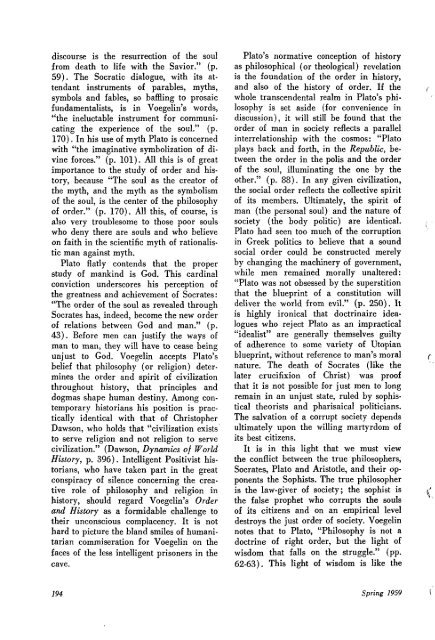Plato and Aristotle
Plato and Aristotle
Plato and Aristotle
You also want an ePaper? Increase the reach of your titles
YUMPU automatically turns print PDFs into web optimized ePapers that Google loves.
discourse is the resurrection of the soul<br />
from death to life with the Savior.” (p.<br />
59). The Socratic dialogue, with its at-<br />
tendant instruments of parables, myths,<br />
symbols <strong>and</strong> fables, so baffling to prosaic<br />
fundamentalists, is in Voegelin’s words,<br />
“the ineluctable instrument for communi-<br />
cating the experience of the soul.” (p.<br />
170). In his use of myth <strong>Plato</strong> is concerned<br />
with “the imaginative symbolization of di-<br />
vine forces.” (p. 101). All this is of great<br />
importance to the study of order <strong>and</strong> his-<br />
tory, because “The soul as the creator of<br />
the myth, <strong>and</strong> the myth as the symbolism<br />
of the soul, is the center of the philosophy<br />
of order.” (p. 170). All this, of course, is<br />
also very troublesome to those poor souls<br />
who deny there are souls <strong>and</strong> who believe<br />
on faith in the scientific myth of rationalis-<br />
tic man against myth.<br />
<strong>Plato</strong> flatly contends that the proper<br />
study of mankind is God. This cardinal<br />
conviction underscores his perception of<br />
the greatness <strong>and</strong> achievement of Socrates:<br />
“The order of the soul as revealed through<br />
Socrates has, indeed, become the new order<br />
of relations between God <strong>and</strong> man.” (p.<br />
43). Before men can justify the ways of<br />
man to man, they will have to cease being<br />
unjust to God. Voegelin accepts <strong>Plato</strong>’s<br />
belief that philosophy (or religion) deter-<br />
mines the order <strong>and</strong> spirit of civilization<br />
throughout history, that principles <strong>and</strong><br />
dogmas shape human destiny. Among con-<br />
temporary historians his position is prac-<br />
tically identical with that of Christopher<br />
Dawson, who holds that “civilization exists<br />
to serve religion <strong>and</strong> not religion to serve<br />
civilization.” (Dawson, Dynamics of World<br />
History, p. 396). Intelligent Positivist his-<br />
torians, who have taken part in the great<br />
conspiracy of silence concerning the crea-<br />
tive role of philosophy <strong>and</strong> religion in<br />
history, should regard Voegelin’s Order<br />
<strong>and</strong> History as a formidable challenge to<br />
their unconscious complacency. It is not<br />
hard to picture the bl<strong>and</strong> smiles of humani-<br />
tarian commiseration for Voegelin on the<br />
faces of the less intelligent prisoners in the<br />
cave.<br />
<strong>Plato</strong>’s normative conception of history<br />
as philosophical (or theological) revelation<br />
is the foundation of the order in history,<br />
<strong>and</strong> also of the history of order. If the<br />
whole transcendental realm in <strong>Plato</strong>’s philosophy<br />
is set aside (for convenience in<br />
discussion), it will still be found that the<br />
order of man in society reflects a parallel<br />
interrelationship with the cosmos: “<strong>Plato</strong><br />
plays back <strong>and</strong> forth, in the Republic, between<br />
the order in the polis <strong>and</strong> the order<br />
of the soul, illuminating the one by the<br />
other.” (p. 88). In any given civilization,<br />
the social order reflects the collective spirit<br />
of its members. Ultimately, the spirit of<br />
man (the personal soul) <strong>and</strong> the nature of<br />
society (the body politic) are identical.<br />
<strong>Plato</strong> had seen too much of the corruption<br />
in Greek politics to believe that a sound<br />
social order could be constructed merely<br />
by changing the machinery of government,<br />
while men remained morally unaltered:<br />
“<strong>Plato</strong> was not obsessed by the superstition<br />
that the blueprint of a constitution will<br />
deliver the world from evil.” (p. 250). It<br />
is highly ironical that doctrinaire idealogues<br />
who reject <strong>Plato</strong> as an impractical<br />
“idealist” are generally themselves guilty<br />
of adherence to some variety of Utopian<br />
blueprint, without reference to man’s moral c<br />
nature. The death of Socrates (like the<br />
later crucifixion of Christ) was proof<br />
that it is not possible for just men to long<br />
remain in an unjust state, ruled by sophis-<br />
tical theorists <strong>and</strong> pharisaical politicians.<br />
The salvation of a corrupt society depends<br />
ultimately upon the willing martyrdom of<br />
its best citizens.<br />
It is in this light that we must view<br />
the conflict between the true philosophers,<br />
Socrates, <strong>Plato</strong> <strong>and</strong> <strong>Aristotle</strong>, <strong>and</strong> their op-<br />
ponents the Sophists. The true philosopher<br />
is the law-giver of society; the sophist is<br />
the false prophet who corrupts the souls<br />
of its citizens <strong>and</strong> on an empirical level<br />
destroys the just order of society. Voegelin<br />
notes that to <strong>Plato</strong>, “Philosophy is not a<br />
doctrine of right order, but the light of<br />
wisdom that falls on the struggle.” (pp.<br />
62-63). This light of wisdom is like the<br />
194 Spring 1959 I<br />
1<br />
(<br />
6.
















